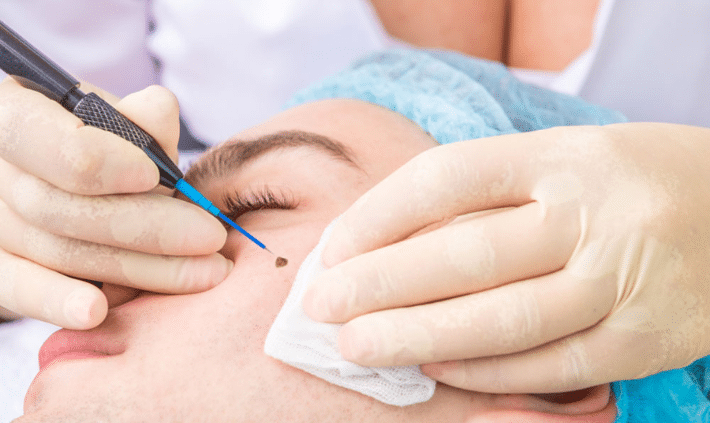In today’s world, many people seek specialized care for their skin. Personalized surgical dermatology treatments offer targeted solutions for various skin types and conditions. This field combines advanced techniques and individualized treatment plans to address unique skin issues effectively. Whether you have acne scars, skin cancer, or other dermatological concerns, surgical dermatology can provide the relief you need. With a focus on safety and effectiveness, it emphasizes individualized care for each patient.
In this blog, we’ll explore what surgical dermatology entails and how it can help you achieve healthier skin.
What is Surgical Dermatology?
Surgical dermatology is a specialized branch of medicine focusing on skin surgery. It encompasses a variety of procedures aimed at diagnosing and treating skin disorders. Dermatologists who practice in this field use advanced techniques to provide solutions for various skin issues, including:
- Skin Cancer: Removal of cancerous lesions and surrounding tissue to prevent further spread.
- Acne Scarring: Surgical options to minimize the appearance of scars left by severe acne.
- Cysts and Growths: Removal of benign or harmful growths on the skin.
- Cosmetic Enhancements: Procedures to improve skin texture and appearance, such as excisions or facelifts.
These treatments are designed to address specific skin concerns while ensuring the best possible outcomes for patients.
Tailored Treatments for Different Skin Types
Every individual has a unique skin type, and surgical dermatology recognizes this diversity. Personalized surgical dermatology treatments are customized based on various factors, including skin type, age, and specific concerns. Here are some tailored solutions available in this field:
1. Treatments for Oily Skin
Individuals with oily skin may experience issues like acne and enlarged pores. Surgical dermatology can help through:
- Excision: Removing large cysts that may form due to excessive oil production.
- Laser Treatments: Targeting oil glands to reduce acne outbreaks and improve skin texture.
2. Solutions for Dry Skin
For those with dry skin, surgical dermatology offers treatments to restore hydration and health, such as:
- Chemical Peels: Removing dead skin cells to enhance moisture absorption.
- Dermal Fillers: Adding volume and hydration to dry areas, improving overall skin appearance.
3. Treatments for Combination Skin
Combination skin requires a balanced approach. Treatments may include:
- Microneedling: Stimulating collagen production for improved skin texture without harsh side effects.
- Targeted Excision: Removing growths or lesions specific to oily or dry areas.
4. Procedures for Sensitive Skin
Sensitive skin demands gentle treatment. Surgical dermatology provides options like:
- Cryotherapy: Freezing abnormal skin cells without causing irritation.
- Non-invasive Laser Treatments: Reducing redness and inflammation safely.
Each treatment aims to improve skin health while addressing individual needs.
Benefits of Surgical Dermatology
Personalized surgical dermatology treatments offer numerous benefits that can significantly enhance your skin health. Here are some key advantages:
- Precision: Specialized techniques ensure targeted treatment, reducing damage to surrounding tissues.
- Quick Recovery: Many procedures have minimal downtime, allowing patients to return to daily activities sooner.
- Long-lasting Results: Surgical interventions often provide permanent solutions for skin conditions.
- Personalized Care: Tailored treatment plans address specific concerns, leading to higher satisfaction rates.
These benefits contribute to the increasing popularity of surgical dermatology among individuals seeking effective skin solutions.
What to Expect During a Surgical Dermatology Procedure?
If you decide to pursue a procedure in surgical dermatology, here’s what you can typically expect:
- Consultation: Your dermatologist will assess your skin and discuss your concerns.
- Treatment Plan: A personalized plan will be created based on your skin type and desired outcomes.
- Procedure Day: Most procedures are outpatient, and local anesthesia is often used for comfort.
- Post-Procedure Care: Your dermatologist will provide instructions for recovery and follow-up.
Understanding the process can help ease any anxiety and ensure you feel prepared.
Maintaining Healthy Skin After Treatment
After undergoing dermatology treatments, it’s essential to maintain your skin health. Here are some tips:
- Follow Care Instructions: Adhere to your dermatologist’s guidelines for optimal healing.
- Use Sunscreen: Protect your skin from UV rays to prevent damage.
- Stay Hydrated: Drink plenty of water to keep your skin moisturized from within.
- Regular Check-ups: Schedule follow-up appointments to monitor your skin’s progress.
Implementing these practices will help sustain the results of your treatment.
Embrace Healthier Skin with Surgical Dermatology
Surgical dermatology offers tailored solutions for various skin types and conditions. With its focus on individualized care, it addresses unique needs effectively. Whether you are struggling with skin cancer, acne scars, or cosmetic concerns, personalized surgical dermatology treatments provide various options. You can achieve healthier, more radiant skin by choosing this treatment option. Consult a qualified dermatologist today to explore the best options for your skin. Embrace the possibilities that surgical dermatology can bring to your life!
Frequently Asked Questions
What conditions does surgical dermatology treat?
Surgical dermatology addresses a wide range of conditions, including skin cancer, cysts, moles, and severe acne scars. It also handles cosmetic procedures like facelifts, skin grafts, and the removal of unwanted skin lesions.
Is surgical dermatology safe?
Yes, surgical dermatology is generally safe when performed by qualified professionals. Like any medical procedure, there are risks involved, but serious complications are rare. A thorough consultation and pre-operative assessment help minimize risks.
What is the recovery time for surgical dermatology procedures?
Recovery times vary depending on the procedure. Minor surgeries may require only a few days of downtime, while more extensive surgeries could take several weeks for full recovery. Your dermatologist will provide specific recovery guidelines based on your treatment.

